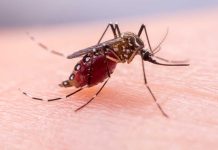
(DailyDig.com) – A recent study revealed that microplastics have been found almost everywhere: in our water, air, and food. Researchers estimate that humans may ingest nearly the same amount of plastic as a credit card each week. The question that researchers are investigating is the body’s reaction to plastics.
The study, published in the Environment Health Perspective journal, stated that very small fragments of plastic are showing up in the brains of humans. The researchers at New Mexico University discovered that the microplastics that we consume or breathe in travel to other body parts like the liver, kidneys, and brain.
Over the last thirty or forty years, these microplastics have been discovered in tap and bottled water, animals, the ocean, and plants, according to a press release by a professor at New Mexico’s School of Medicine, Eliseo Castillo. He stated that microplastics seem to be throughout the world.
In Castillo’s research, they observed mice that were given the same amount of water that humans drink weekly. The results showed that, over four weeks, the mice had their ingested microplastics travel from their stomachs to show up in tissues in other parts of their bodies. That proved, as Castillo stated, that they can travel through the intestinal barrier to show up in tissues throughout the body.
The mice were healthy prior to the experiment, and after it was completed, they showed they had changes physically as the microplastics in the tissues outside the gut altered their metabolism. Castillo’s concern for humans is the changes the body develops and that microplastics could exacerbate any condition a person may have, which would then cause them serious harm.
Chronic exposure to microplastics from birth to death is likely to have systematic effects on humans. Castillo said that his study plans to regulate the mice’s diets in the laboratory, giving groups of them different types of diets, such as high-fat, high-fiber, or high-cholesterol diets. This could provide insight into the impact of microplastics on the body.
Copyright 2024, DailyDig.com













